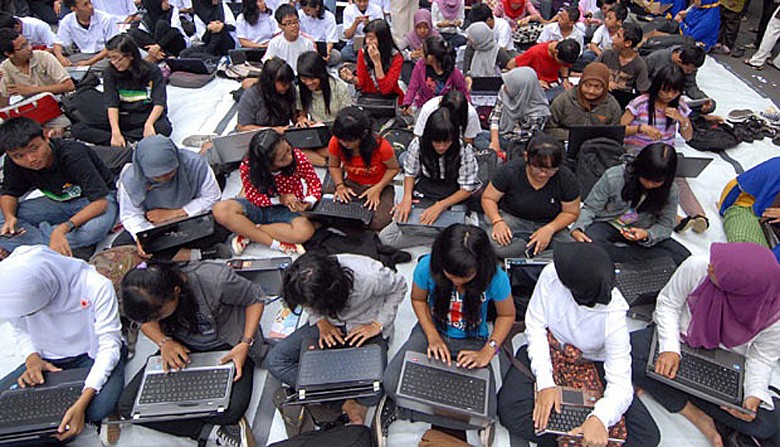Tech giants train Indonesians to tap into latent potential. The technology behemoths of the world are rolling out digital training programs in Indonesia, a country of significant relevance to their businesses, to address literacy and skillset gaps in Southeast Asia’s largest economy.

From United States tech giants Google, Facebook, Apple and Amazon Web Services (AWS) to China’s Alibaba, Huawei and ByteDance’s TikTok, they have been working alongside the government and local communities to scale up their digital trainings so that more Indonesians can benefit.
Digital proficiency will lead Indonesians to consume more of the technology giants’ products and services, with the country poised to have the largest digital economy in Southeast Asia, with a value of US$100 billion by 2025, up from $27 billion in 2018, according to the annual “e-Conomy Southeast Asia” study conducted by Google and Singaporean holding company Temasek.
“To become the biggest digital economy [in Southeast Asia], Indonesia needs an excellent workforce,” said Huawei CNBG Indonesia CEO Andy Ma Hui, adding that the forecast had motivated the company to contribute to growth through its upskilling programs.
Huawei announced on Thursday it was offering a base transceiver station and microwave vocational training program for 1,000 participants in partnership with the Manpower Ministry through the ministry’s training centers in Bekasi, West Java.
The Manpower Ministry has seen a drastic increase in business participation in promoting better human capital, primarily from the digital economy sector, to capitalize on the country’s massive and under-developed digital potential, said the ministry’s Training and Productivity Supervision Director General Bambang Satrio Lelono.
On Wednesday, US tech giant Amazon’s cloud computing arm AWS unveiled in an interview with The Jakarta Post that the company would initiate its cloud-computing skills enhancement plan to target hundreds of thousands of Indonesians by 2025.
Amazon’s cloud technology rival Alibaba Cloud has also picked up the pace with its own version of cloud technology classes. Meanwhile, Google claims to have provided training for 1 million small and medium enterprises (SMEs) in Indonesia from 2015 to 2018 through its various digital skills training programs.
From 2018 to 2019, Facebook visited 15 cities in Indonesia as part of its “Laju Digital” campaign, including in the eastern part of the country, to provide training for SMEs, communities, local governments and students so they can better utilize the company’s platforms.
Meanwhile, Apple launched its third Apple Developer Academy in the world in BSD, Tangerang, in 2018 to equip students with “world class” web development skills relevant to Indonesia, said Industry Minister Airlangga HArtato.
Communications and Information Minister Rudiantara described these human capital trainings as added value that multinational tech giants could bring to the table in Indonesia to boost the country’s ability to provide “local content” for the skills side of the digital economy.
Such steps to develop the national workforce conform with President Joko “Jokowi” Widodo’s goal to foster well-educated workers who can contribute to the nation’s economy through increased productivity and innovation.
Center of Reform on Economics (CORE) Indonesia research head Mohammad Faisal said the trend was positive, as it could help push down the open unemployment rate, adding that it was typical to see companies follow a president’s agenda during their presidency.
However, he still urged the government to expand skills training and job opportunities for the digital economy’s formal sector by working with industry players, as recent Statistics Indonesia (BPS) data shows that the informal sector accounts for 57.27 percent of employment nationwide.
The shift, he said, would be important as the formal sector generally offered higher and more stable pay in addition to better work allowances.
Indonesia’s digital skills gap has dragged downed the country’s competitiveness, with it being out performed by its neighbors Singapore, Malaysia and Thailand in the World Economic Forum’s (WEF) 2018 World Competitiveness Report. Mediocre human capital and low expenditure on research and development have also hindered domestic innovation and technological advancements, according to the report. Tech giants train Indonesians to tap into latent potential (Made Anthony Iswara, The Jakarta Post)





 Keandalan Kamera Bermata Ikan, Siap Jadi Sutradara Sekaligus Pemain?
Keandalan Kamera Bermata Ikan, Siap Jadi Sutradara Sekaligus Pemain? 